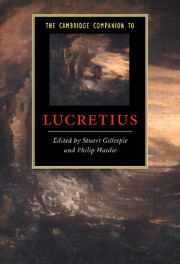Book contents
- Frontmatter
- Introduction
- Part I: Antiquity
- 1 Lucretius and Greek philosophy
- 2 Lucretius and the Herculaneum library
- 3 Lucretius and Roman politics and history
- 4 Lucretius and previous poetic traditions
- 5 Lucretian architecture: the structure and argument of the De rerum natura
- 6 Lucretian texture: style, metre and rhetoric in the De rerum natura
- 7 Lucretius and later Latin literature in antiquity
- Part II: Themes
- Part III: Reception
- Dateline
- List of works cited
- Index of Main Lucretian Passages Discussed
- General Index
6 - Lucretian texture: style, metre and rhetoric in the De rerum natura
from Part I: - Antiquity
Published online by Cambridge University Press: 28 May 2010
- Frontmatter
- Introduction
- Part I: Antiquity
- 1 Lucretius and Greek philosophy
- 2 Lucretius and the Herculaneum library
- 3 Lucretius and Roman politics and history
- 4 Lucretius and previous poetic traditions
- 5 Lucretian architecture: the structure and argument of the De rerum natura
- 6 Lucretian texture: style, metre and rhetoric in the De rerum natura
- 7 Lucretius and later Latin literature in antiquity
- Part II: Themes
- Part III: Reception
- Dateline
- List of works cited
- Index of Main Lucretian Passages Discussed
- General Index
Summary
The message
‘Lucretius … is first and foremost a missionary.’
Lucretius’ mission was to convince his readers of the truth of the fundamental premisses of the Epicurean philosophy, ‘on which rests all of existence’ (fundamenta quibus nitatur summa salutis, 2.863; 4.506). These basic doctrines were grounded on the application of reason and logic to the evidence of the senses, and what Lucretius aimed to achieve was enlightenment through intellectual conviction: to teach and to prove. Empedocles and Parmenides nowhere refer to themselves as teaching; Lucretius, exploiting the ambiguity of the word as signifying both ‘teach’ and ‘prove’ (OLD 3, 4), and conscious of the traditional moral authority of the poet as teacher, uses forms of doceo to refer to his exposition some forty times.
The task was a challenging one. Much of the argument was highly technical, and there was entrenched prejudice and superstition to contend with. To convince connotes winning a battle (OLD conuinco). When Lucretius writes that the behaviour of the moon ‘is difficult to teach by reasoning and to prove by words’ (difficile est ratione docere et uincere uerbis, 5.735) we detect an awareness that there was resistance to be encountered which logic and reason unassisted by force could not overcome. The reader may be brusquely adjured to admit that he has lost the argument, uictus fateare necesse est (1.624; 5.343); and Memmius himself is warned that resistance on his part to Lucretius’ reasoning will be beaten down by an inexhaustible torrent of poetic eloquence (1.410-17).
- Type
- Chapter
- Information
- The Cambridge Companion to Lucretius , pp. 92 - 110Publisher: Cambridge University PressPrint publication year: 2007
- 6
- Cited by

